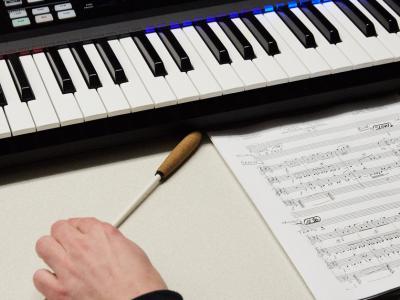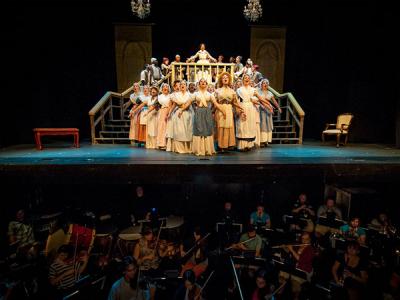What does a Composer (Musical Theater) do?
At a Glance
Most musical theater composers are experienced, educated musicians with a deep understanding of compositional technique and practice. It's never too early to begin creating or scoring work alongside a book writer or lyricist, but debuting on the professional stage can take time. Before getting their big break, musical theater composers might work as professional songwriters, pit orchestra musicians, theatrical music directors, orchestrators, copyists, arrangers, or assistants to established composers.
Those whose songs and stories capture audiences' imaginations can become household names with a huge following and tremendous impact on the medium. There's also the booming field of musical theater adaptation, containing numerous opportunities for skilled and flexible composers. Musical theater composers might also work on film, television, or video game scores, write for opera or concert, or contribute to advertisements, businesses, or products as a freelance composer.
The theater industry, famously small and tightly knit, runs on networking—a practice which is doubly important for musical theater composers, who need to connect with collaborators like librettists and lyricists as well as career-enablers like producers, directors, and artistic directors if they want to succeed. In addition, prestigious festivals and companies often have opportunities for residencies, and may offer commissions.
Finally, aspiring musical theater composers should be aware of a wealth of opportunities in a parallel field: composing incidental music and songs for traditional plays. While in many ways it is an entirely different profession and art form, composing for plays can be an opportunity for musical theater composers to grow their professional networks, practice storytelling-oriented composition, and gain experience in a collaborative process.
- Songwriting (melody, harmony, and structure)
- Music composition (overtures, underscore, and short musical cues)
- Developing musical themes and character leitmotifs
- Ability to write music that advances plot, reveals character, and underscores themes
- Music notation (and relevant software)
- Experience with theater
- General knowledge of instruments
- Lyric writing
- Orchestration
- Stylistic versatility
- Collaboration
- Networking
Musical theater composers are in many ways defined by their collaborative, adaptable, and interdisciplinary approach to writing music. They're invested in the process of working with other creatives to construct a multifaceted theatrical experience, and understand the creative give-and-take necessary to accomplish this. Musical theater composers enjoy working within the constraints of a story, and excel at writing music that enhances character and narrative. Catchy songwriting is often seen as the trait most necessary for mainstream success.
New York City and London are the two hotbed locations for this industry. However, there are book writers, lyricists, and small theater companies willing to produce original musicals all over the United States. Musical theater composers typically begin their work after receiving an outline or completed book from a book writer, or after receiving a commission from a producing party. They proceed to develop songs and instrumental music, collaborating with the book writer and a lyricist, if necessary. Following this, the musical might enter an intensive workshopping process wherein the script, music, and lyrics are thoroughly critiqued and revised. Finally, if picked up by a theater company or festival, the show enters production.





